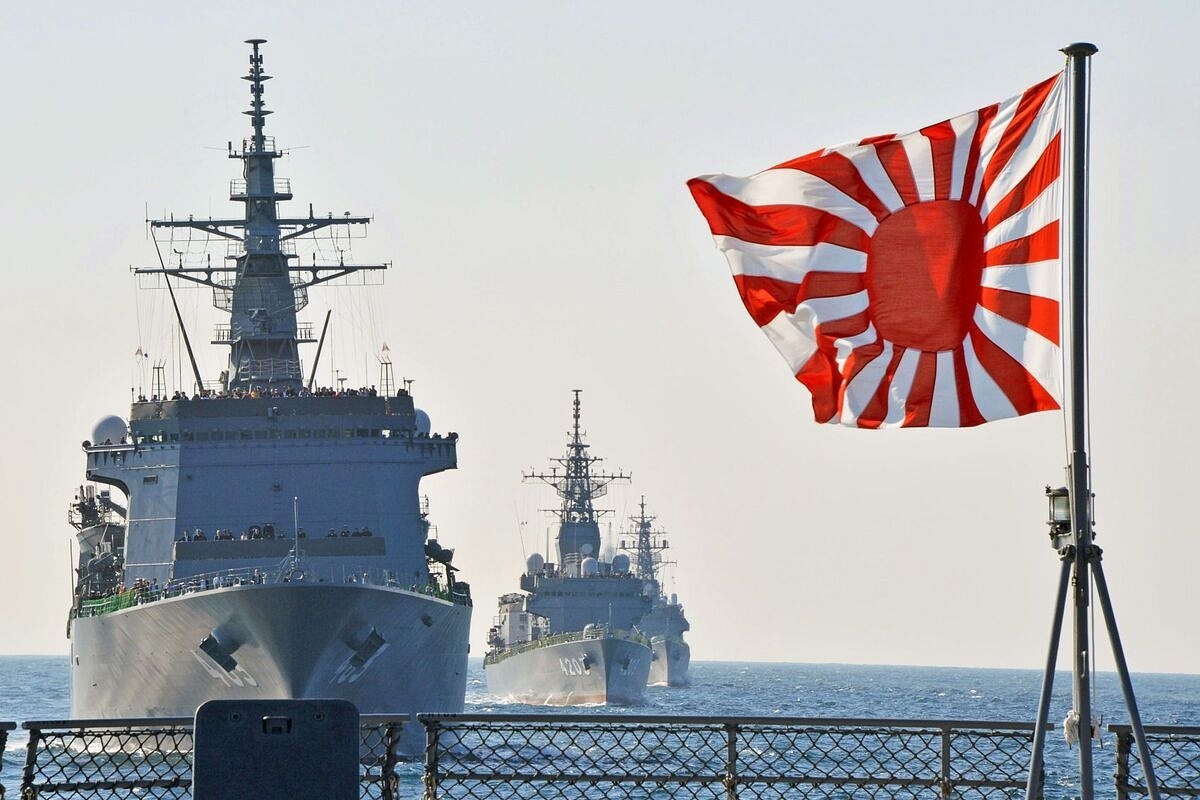News Brief
Japan To Increase Defence Spending To Over $70 Billion By 2027 As It Junks Post World War II Pacifism To Deter China

The rising sun flag with Japanese naval vessels in the background.
Japan will raise its defence spending to 2 per cent of its gross domestic product (GDP) by 2027, Prime Minister Fumio Kishida has said.
For the fiscal year 2023, Japan's defence budget stands at around $43 billion or a little over 1 per cent of the GDP. The spending on defence has been set at around one per cent of GDP or less for decades. But by 2027, the country's defence budget will likely surpass the $70 billion mark.
Kishida's Liberal Democratic Party (LDP), which has been in power almost continuously since 1955, had pledged to double defence spending to 2 per cent in its manifesto for elections held earlier this year.
The decision to raise the defence budget comes ahead of the announcement of a revised national security strategy and defence build-up plan by the end of the year. Japan is revising its defence posture to address the security problems posed by a rising and increasingly assertive China.
Given Prime Minister Kishida's pronouncement to "fundamentally reinforce Japan's defense capabilities within the next five years," raising the defence budget seems to be the logical next step in Japan's move away from its pacifist turn following the second world war and towards the development of credible hard power to deter Chinese misadventures.
Japan's pacifist constitution was drafted by American occupation forces after the Japanese surrender in the second world war. The constitution, in its anti-militarist Article 9, forbids the use of force in international disputes.
Japan's shift away from this pacifist turn was set in motion by late former Prime Minister Abe Shinzo, who was assassinated earlier this year.
In 2014, Abe's LDP government approved the reinterpretation of the constitution, allowing the Japanese Self-Defense Forces for the first time to provide material support to Japan's allies in the event of war.
The debate over whether the "no war" clause in the constitution should be reformed or scrapped has intensified in recent years.
In 2021, at the height of tensions between China and Taiwan, Japanese Defence Minister Nobuo Kishi, former Prime Minister Abe's younger brother, said Taiwan's security was linked to Japan's.
With the military balance tipped in China's favour and questions over the US' willingness to intervene in the event of the invasion of Taiwan by the Chinese Communist Party, this was seen as an attempt to prepare the ground for Japan's greater involvement in responding to a future crisis.
"It [China's aggressive behaviour] clearly shows that if anything happened with Taiwan that we will be affected," Taro Kono, who served as defence minister under Abe, said recently, reemphasizing the link drawn by Kishi.
A recent poll conducted by state broadcaster NHK found that 55 per cent of those surveyed favoured an increase in the country's defence spending, while around 29 per cent were opposed to it.
An increase in the defence budget, Japanese officials have said, will allow the country to develop "counter attack" capabilities. This would involve the development of stand-off weapons, including long-range cruise missiles, capable of taking out targets deep inside the Chinese mainland.
The raise would also bring Japan's defence spending in line with the target specified for the members of the North Atlantic Treaty Organization — the Europen allies of the United States.
Support Swarajya's 50 Ground Reports Project & Sponsor A Story
Every general election Swarajya does a 50 ground reports project.
Aimed only at serious readers and those who appreciate the nuances of political undercurrents, the project provides a sense of India's electoral landscape. As you know, these reports are produced after considerable investment of travel, time and effort on the ground.
This time too we've kicked off the project in style and have covered over 30 constituencies already. If you're someone who appreciates such work and have enjoyed our coverage please consider sponsoring a ground report for just Rs 2999 to Rs 19,999 - it goes a long way in helping us produce more quality reportage.
You can also back this project by becoming a subscriber for as little as Rs 999 - so do click on this links and choose a plan that suits you and back us.
Click below to contribute.
Latest